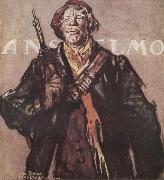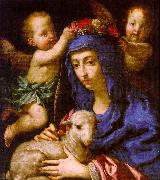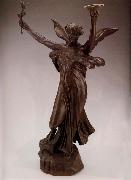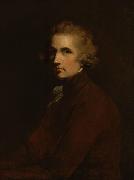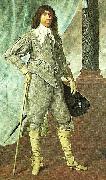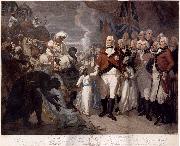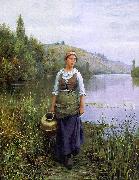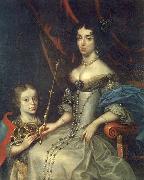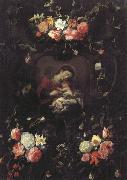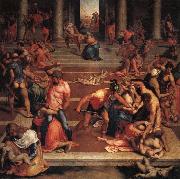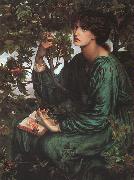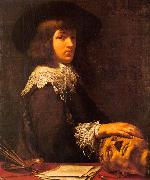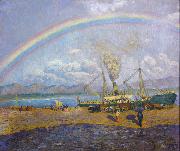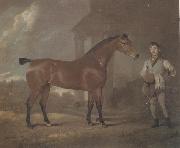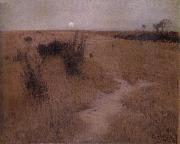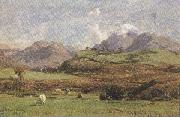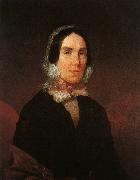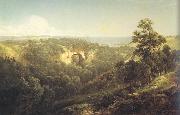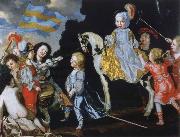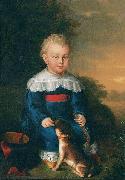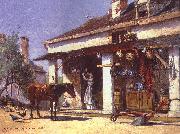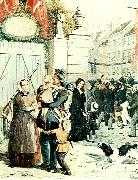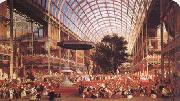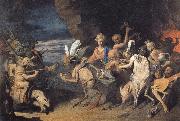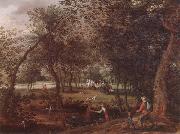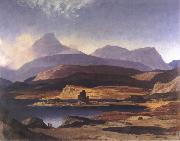|
|
|
|
|
|
|
|
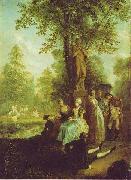 |
Daniel Chodowiecki
|
|
(16 October 1726 - 7 February 1801) was a Polish - German painter and printmaker with Huguenot ancestry, who is most famous as an etcher. He spent most of his life in Berlin, and became the director of the Berlin Academy of Art.
He was born in the city of Danzig in Poland, and in a letter in typical Berlin humor wrote, that he moved to Berlin, Germany, which shows for sure, that he is a 'genuine Pole'.[citation needed] He kept close to the Huguenot scene, due to his ancestry. A distant ancestor Bartholom us Chodowiecki had lived in the 16th century in Greater Poland . Gottfried Chodowiecki, Daniel's father, was a tradesmen in Danzig and his mother, Henriette Ayrer born in Switzerland, was a Huguenot. Daniel's grandfather Christian had been a tradesmen in the city as well. When his father died, both Daniel (aged 16) and his younger brother Gottfried Chodowiecki went to live with their uncle in Berlin, who offered to educate them, and where Daniel received an artistic training with the painter Haid in Augsburg. His brother also became a painter.
Soon Daniel was able to earn a living by painting. He was admitted to the Berlin Academy in 1764 and became vice-director under Rhode in 1788. He had found his true calling and became the most famous German graphic artist of his time. His works include several thousand etchings, usually rather small, and many drawings and paintings. He illustrated nearly all of the great classics. His prints represent in great detail the life of the middle classes during the Zopfstil period, a time between Rococo and Classicism. In 1797 Chodowiecki was appointed director of the Academy of Arts in Berlin, where he died on 7 February 1801. The bulk of his work was in illustrating scientific books by Basedow, Buffon, Lavater, Pestalozzi and others. He also painted many portraits of Polish gentry and was interested in Huguenot and Polish history as well, making some paintings on the topic. He was in tune with the developing spirit of the age, and many works reflect the cult of sensibility, and then the revolutionary and German nationalist feelings of the end of the century. |
|
|
|
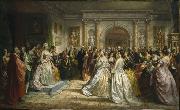 |
Daniel Huntington
|
|
(October 4, 1816 -April 19, 1906), American artist, was born in New York City, New York, the son of Benjamin Huntington, Jr. and Faith Trumbull Huntington; his paternal grandfather was Benjamin Huntington, delegate at the Second Continental Congress and First U.S. Representative from Connecticut.
In 1835 he studied with Samuel F.B. Morse, and produced "A Bar-Room Politician" and "A Toper Asleep." Subsequently he painted some landscapes on the Hudson river, and in 1839 went to Rome. On his return to America he painted portraits and began the illustration of The Pilgrim's Progress, but his eyesight failed, and in 1844 he went back to Rome.
Returning to New York around 1846, he devoted his time chiefly to portrait-painting, although he painted many genre, religious and historical subjects. From 1851 to 1859 he was in England. He was president of the National Academy from 1862 to 1870, and again in 1877-1890.
|
|
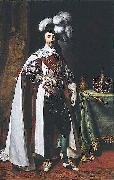 |
Daniel Mijtens
|
|
(Delft, c. 1590 - The Hague, 1647/48), known in England as Daniel Mytens the Elder, was a Dutch portrait painter who spent the central years of his career working in England.
He was born in Delft into a family of artists and trained in The Hague, possibly in the studio of Van Mierevelt. He was the nephew of the painter Aert Mijtens, the older brother of the painter Isaac Mijtens, and the father of the painter Daniel Mijtens the Younger. No known work survives from his first Dutch period.
By 1618, he had moved to London where his initial patron was the leading art collector Thomas Howard, 21st Earl of Arundel. Mijtens painted the Earl and his Countess, and was soon commissioned to paint King James I and his son Charles, Prince of Wales. In 1625 he became painter to Charles I.
After the prince's accession to the throne as Charles I in 1625 Mijtens produced such a large number of full length portraits of Charles I and his courtiers, including duplicates, that it is assumed that he had workshop assistance. Two of his finest portraits are of the same man, James Hamilton later 1st Duke of Hamilton, whom he painted as a seventeen year old in 1623 and again in 1629. Mijtens made visits to the Netherlands in 1626 and 1630, perhaps to study the latest developments in his field, more particularly the works of Rubens and Van Dyck.
Mijtens introduced a new naturalism into the English court portrait, but after the arrival in England of the far more distinguished Anthony Van Dyck in 1632 he was superseded as the leading court portraitist, and around 1634 he appears to have returned to the Netherlands permanently. He subsequently worked primarily as an art dealer in The Hague, acquiring works for the Earl of Arundel among others. Only four paintings survive from this final period.
Some of Mijtens' works are still owned by the Royal Family. Mitjens also made copies of old portraits of royal sitters including; James IV of Scotland, his wife Margaret Tudor, and Mary, Queen of Scots.
|
|
|
|
|
|
|
|
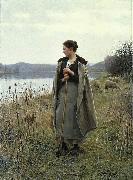 |
Daniel Ridgway Knight
|
|
(March 15, 1839 - March 9, 1924) was an American artist born at Philadelphia, Pennsylvania. He was a pupil at the Ecole des Beaux-Arts, Paris, under Gleyre, and later worked in the private studio of Meissonier. After 1872 he lived in France, having a house and studio at Poissy on the Seine.
Spring BlossomsHe painted peasant women out of doors with great popular success. He was awarded the silver medal and Cross of the Legion of Honor, Exposition Universelle, Paris, 1889, and was made a Knight of the Royal Order of St. Michael of Bavaria, Munich, 1893, and receiving the gold medal of honor from the Pennsylvania Academy of the Fine Arts, Philadelphia, 1893. His son, Louis Aston Knight (1873 - 1948), is also known as a landscape painter.
|
|
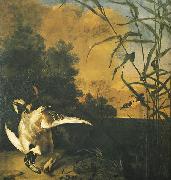 |
Daniel Schultz
|
|
(1615 - 1683) was a famous painter of the Baroque era, born and active in the Polish - Lithuanian Commonwealth. He painted many Polish and Lithuanian nobles, members of the royal family, local Patricians, such as the astronomer Johannes Hevelius, and animals. |
|
|
|
|
|
|
|
|
|
|
|
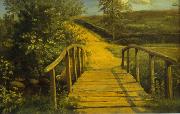 |
Dankvart Dreyer
|
|
(13 June 1816 - 4 November 1852) was a Danish landscape painter of the Copenhagen School of painters who was educated under the guidance of Christoffer Wilhelm Eckersberg. Around 1840, he was part of the emerging National Romantic landscape painting scene in Denmark but as a result of his over-dramatic and excessively natural style, he did not fit the aestetics and the ideology of the period. After being widely criticized, he turned his back on the artistic establishment and passed into near oblivion. In 1852, when only 36 years old, he died from typhus.
Posthumously, half a century after his death, his reputation was restored, prompted by the art historian Karl Madsen, and today he is considered to be one of the leading Danish landscape painters of his day, the peer of his more famous contemporaries P.C. Skovgaard and Johan Lundbye.
|
|
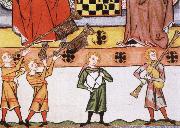 |
dante alighieri
|
|
Born: 1265
Birthplace: Florence, Italy
Died: September 1321 (Malaria)
Best Known As: The author of The Divine Comedy
|
|
|
|
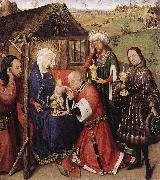 |
DARET, Jacques
|
|
Netherlandish Northern Renaissance Painter, ca.1404-1470
|
|
|
|
|
|
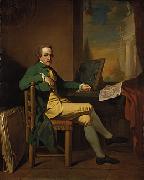 |
David Allan
|
|
13 February 1744 C 6 August 1796) was a Scottish painter, best known for historical subjects.
He was born at Alloa in central Scotland. On leaving Foulis's academy of painting at Glasgow (1762), after seven years' successful study, he obtained the patronage of Lord Cathcart and of Erskine of Mar, on whose estate he had been born. Erskine made it possible for him to travel to Rome (1764), where he remained for several years engaged principally in copying the old masters.
Among the original works which he then painted was the "Origin of Portraiture", now in the National Gallery at Edinburgh--representing a Corinthian maid drawing her lover's shadow--well known through Domenico Cunego's excellent engraving. This won him the gold medal given by the Academy of St Luke in the year 1773 for the best specimen of historical composition. |
|
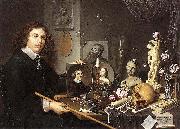 |
David Bailly
|
|
(1584-1657) was a Dutch Golden Age painter.
Bailly was born at Leyden in the Dutch Republic, the son of a Flemish immigrant, calligrapher and fencing master, Peter Bailly. As a draftsman, David was pupil of his father and the copper engraver Jacques de Gheyn.
David Bailly apprenticed with a surgeon-painter Adriaan Verburg in Leiden and then with Cornelius van der Voort (1576-1624), a portrait painter in Amsterdam. According to Houbraken, in the winter of 1608, Bailly took his Grand Tour, travelling to Frankfurt, Nuremberg, Augsburg Hamburg, and via Tirol to Venice, and from there to Rome. On his return he spent five months in Venice, all the while working as a journeyman where he could, before crossing the alps again in 1609. On his return voyage, Bailly worked for several German princes including the Duke of Brunswick. Upon his return to the Netherlands in 1613, Bailly began painting still-life subjects and portraits, including self-portraits and portraits of his students and professors at the University of Leiden. He is known for making a number of vanities paintings depicting transience of this life, with such ephemeral symbols as flowers and candles. Bailly taught his nephews Harmen and Pieter Steenwijck.
|
|
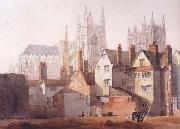 |
David Cox
|
|
David Cox [English Painter, 1783-1859] |
|
|
|
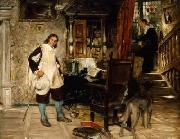 |
David Dalhoff Neal
|
|
(October 20, 1838 - May 2, 1915), was an American artist.
David Dalhoff Neal was born to father Stephen Bryant Neal and mother Mary (Dalhoff) Neal, on Middlesex Street, in Lowell, Massachusetts. His grandparents were Stephen Neal, and David Dalhoff and Sally (Bean) Dalhoff of Canterbury, New Hampshire, Dolhoffs that emigrated from Russia in 1763, for whom he was named. His mother's family, the Beans, migrated from Holland in the early 1830s. His aunt Elizabeth Dolhoff was very artistic, and his uncle Jesse Dolhoff was a great singer.
He attended Lowell grammar schools, and high school at Lawrence, Massachusetts. Deciding to devote himself to the study of art, he then attended art classes at the recently opened Andover Academy in Andover, New Hampshire. When Neal was 14, his father died and his fortunes were "impaired", so he set sail for New Orleans. Here at the age of 15, he worked the docks as a wharf clerk with a wood shipping firm dealing in Brazilian and Honduran mahogany. |
|
|
|
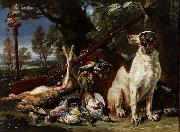 |
David de Coninck
|
|
(ca. 1644 Antwerp - after 1701, Brussels), also known as Rammelaar was a Flemish painter of the Baroque period. David Koninck was born in Antwerp and studied there under Jan Fyt. After a few years in Paris, he staid in Rome from ca 1671 to 1694, where joined the Bentvueghels with the nickname Rammelaar (rattle). He is sometimes stated to have died in Rome in 1687; however, he returned to his home country and is last recorded becoming a member of the painters guild in Brussels in 1701. His pictures are chiefly landscapes with animals and still life. He is likely unrelated to the generally contemporary Dutch painters, Philip de Koninck, or Philips Koninck (5 November 1619, Amsterdam - buried 4 October 1688, Amsterdam) and the fellow townsman Salomon de Koninck.
See Biography by Filippo Baldinucci.
|
|
|
|
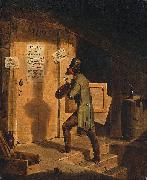 |
David Gilmour Blythe
|
|
(May 9, 1815 - May 15, 1865) was a self-taught American artist best known for paintings which satirically portrayed political and social situations.
Blythe was born in East Liverpool, Ohio on May 9, 1815 to poor parents of Scottish and Irish ancestry. After a childhood in a log cabin by the Ohio River, at the age of 16, Blythe moved to Pittsburgh, Pennsylvania. There he apprenticed himself to woodcarver Joseph Woodwell. In his subsequent work as an itinerant portrait painter, Blythe traveled widely from Baltimore to Philadelphia and perhaps as far as New Orleans. Other than his stint with Woodwell, Blythe had no known artistic education or training. |
|
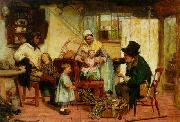 |
David Henry Friston
|
|
(1820 - 1906) was a British illustrator and figure painter in the Victorian Era. He is best remembered as the creator of the first illustrations of Sherlock Holmes in 1887, as well as his illustrations of the controversial female vampire story Carmilla (1872). He is also remembered for his illustrations accompanying reviews of Gilbert and Sullivan operas and plays of W. S. Gilbert in The Illustrated London News and the Illustrated Sporting and Dramatic News in the 1870s and 1880s.
|
|
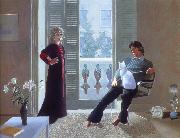 |
david hockney
|
|
Born: 9 July 1937
Birthplace: Bradford, England
Best Known As: British pop artist and critic |
|
|
|
|
|
|
|
|
|
|
|
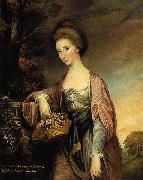 |
David Martin
|
|
painted Portrait of Elizabeth Rennie, Viscountess Melville in 1750-1847
|
|
|
|
|
|
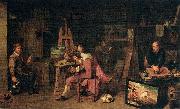 |
David Rijckaert
|
|
David Ryckaert III, sometimes called The Younger (2 December 1612 (baptised) - 11 November 1661) was a Flemish painter.
A member of the Ryckaert family of artists, he was born and raised in Antwerp, the city in which he conducted his career and in which he died. He was the son of David Ryckaert II, grandson of David Ryckaert I, and nephew of Martin Ryckaert.
David Ryckaert was a pupil of his homonymous father; his work was influenced by the styles of Adriaen Brouwer and both David Teniers the Elder and David Teniers the Younger. Ryckaert is noted for large and often humorous genre pictures of farmers and landlords, and powerfully coloured still lifes. He also painted a range of other subjects, including religious pictures; his The Temptation of Saint Anthony (1650) is in the collection of the Palazzo Pitti in Florence.
|
|
|
|
|
|
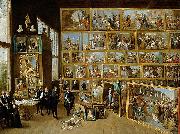 |
David Teniers the Younger
|
|
(December 15, 1610 C April 25, 1690), a Flemish artist born in Antwerp, was the more celebrated son of David Teniers the Elder, almost ranking in celebrity with Rubens and Van Dyck. His son David Teniers III and his grandson David Teniers IV were also painters. His wife Anna nee, Anna Breughel was the daughter of Jan Brueghel the Elder and the granddaughter of Pieter Bruegel the Elder.
Through his father, he was indirectly influenced by Elsheimer and by Rubens. The influence of Adriaen Brouwer can be traced to the outset of his career. There is no evidence, however, that either Rubens or Brouwer interfered in any way with Teniers's education, and Smith (Catalogue Raisonne) may be correct in supposing that the admiration which Brouwer's pictures at one time excited alone suggested to the younger artist his imitation of them. The only trace of personal relations having existed between Teniers and Rubens is the fact that the ward of the latter, Anne Breughel, the daughter of Jan (Velvet) Breughel, married Teniers in 1637.
|
|
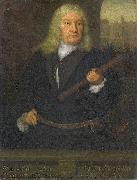 |
David van der Plas
|
|
David van der Plas (1647-1704), was a Dutch Golden Age portrait painter.
David van der Plas became famous as a portrait painter, and his most illustrious patron was Cornelis Tromp. In 1684 he married Cornelia van der Gon of Haarlem, the daughter of the castellan (kastelein) of the Oude Doelen, the meeting quarters of the Haarlem schutterij (the building currently houses the Stadsbibliotheek Haarlem). David van der Plas' brother-in-law was the painter Govert van der Leeuw and his pupil was Jacob Appel.
His wife Cornelia van der Gon was the rich heiress of the Amsterdam architect Adriaan Dortsman (ca. 1636-1682), who designed the round Lutheran church on the Singel. The marriage was childless, and Cornelia spent her time on her doll houses, which Dortsman had helped design and which Van der Plas helped decorate. The landscape painter Jan Wijnants also painted miniatures for these doll houses. Cornelia died in 1701, and after the death of Van der Plas, the doll houses were sold at auction to Sara Rothe, who used them to decorate her own doll houses. |
|
|
|
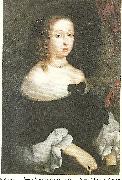 |
david von krafft
|
|
David von Krafft, konstnär, målare, född 1655 i Hamburg, död 1724 i Stockholm.
David von Krafft blev kallad till Sverige 1675 av hofkonterfejaren (hovmålaren) David Klöcker Ehrenstrahl, som dessutom var hans morbror och nu även blev hans lärare i den ädla konsten att måla. Senare studerade von Krafft vidare ett tiotal år i utlandet, särskilt i Italien, slutligen blev han Ehrenstrahls ersättare som hovmålare.
Nu fick han en massa beställningar och uppdrag och han målade sakliga och säkert tecknade porträtt, som tyvärr dock är ganska entoniga och kalla i koloriten. Bland hans bästa arbeten är porträttet av Karl XII (finns i Lund) samt av Carl Gustaf Armfeldt d.ä. (Drottningholms slott). I Kalmar domkyrka har han målat altartavlan (dock efter en komposition av en italiensk konstnär).
David von Krafft finns representerad vid Nationalmuseum, Malmö Museum, Göteborgs konstmuseum och på Gripsholm. Krafft hade ett stort antal lärjungar och bland dem Gustaf Lundberg och Olof Arenius. |
|
|
|
|







